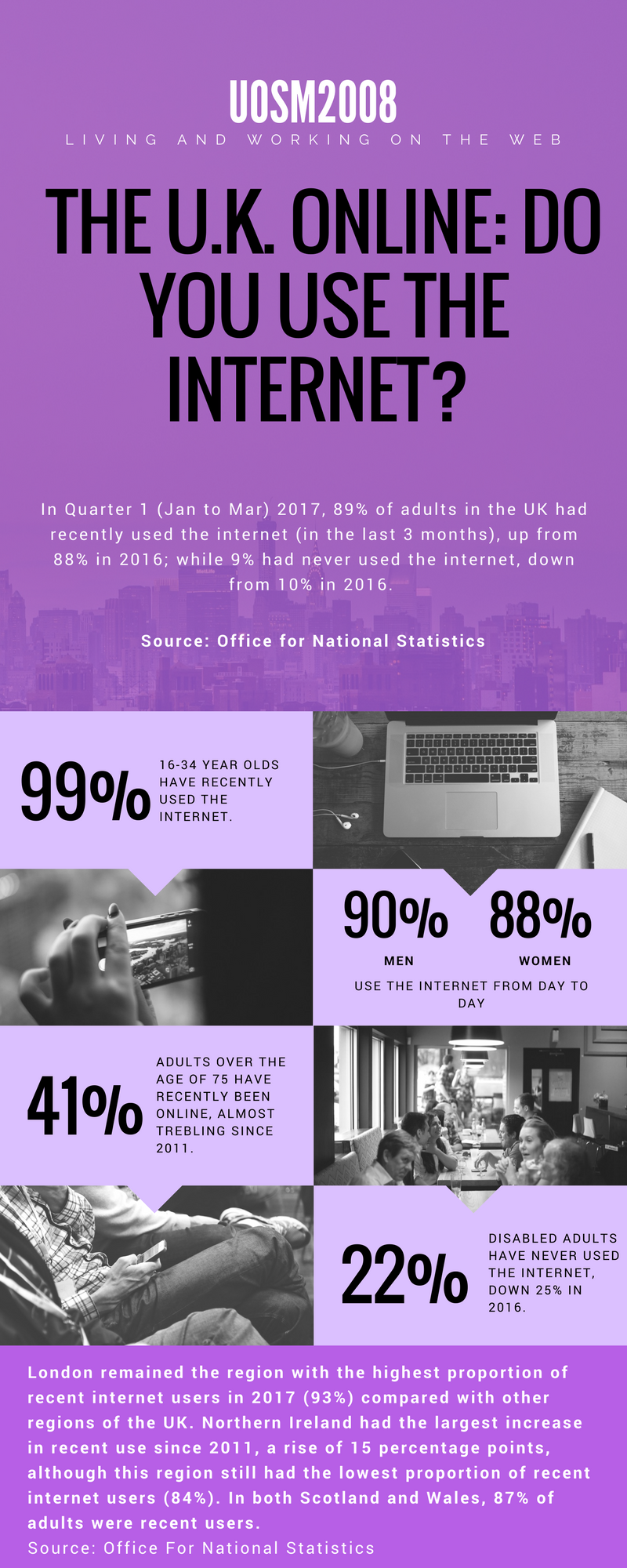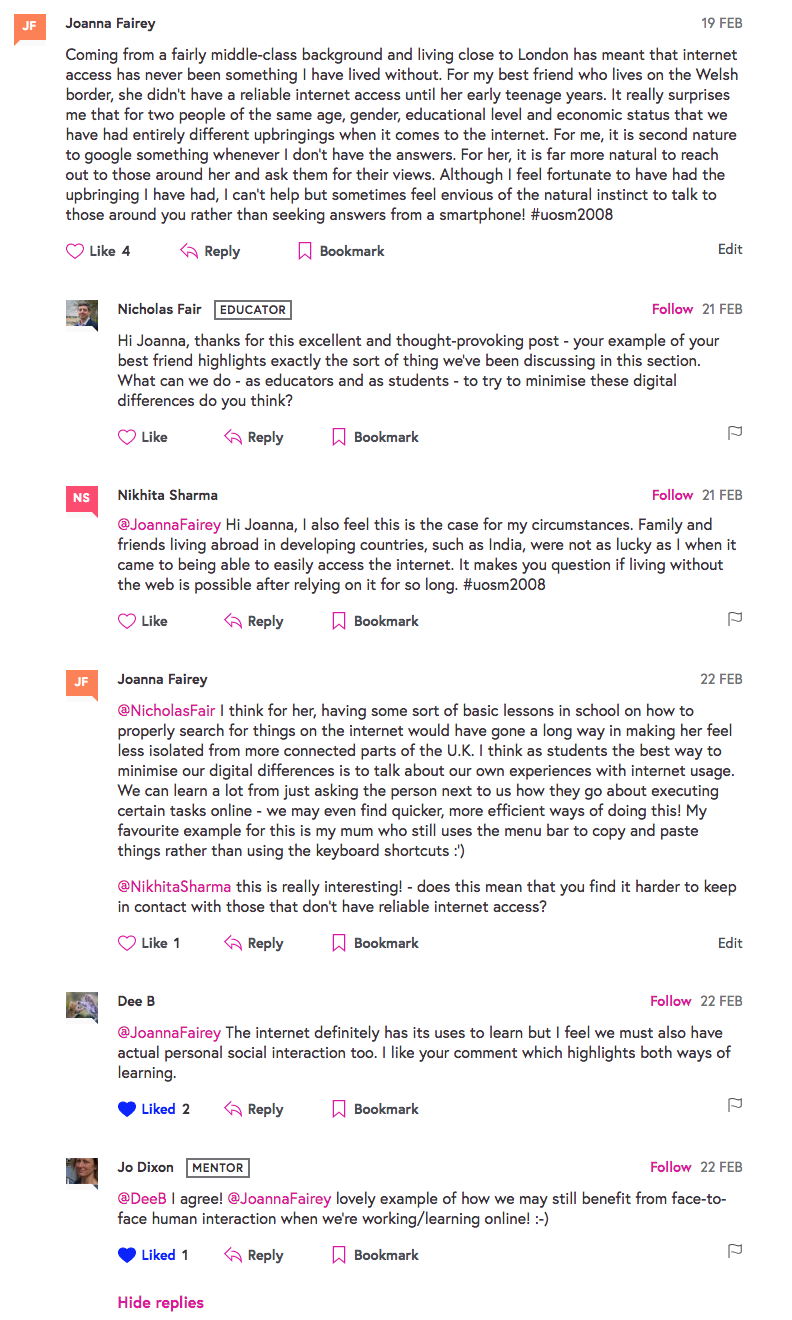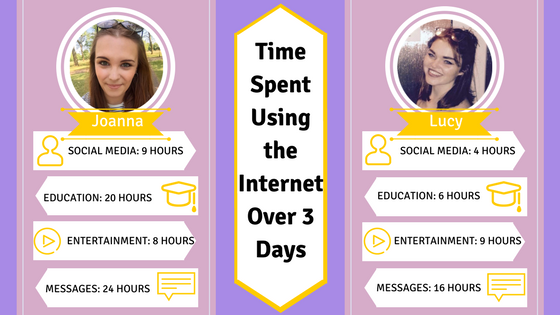Whilst taking part in the ‘Learning in the Network Age’ MOOC as part of the UOSM2008 module, I discovered the concept of ‘digital differences’. Whilst most may assume that everyone uses the web for similar practices, research into this has revealed instead that factors such as age, gender, ethnicity, disability and class all impact if and how people use the internet (Zickuhr and Smith, 2012).

Digital Differences Nationally
Whilst participating in the MOOC mentioned above, I got into a discussion about how I was very digitally different to my housemate. I was brought up with a reliable internet access from a young age whilst she was not. You can read more about the consequences of our two different digital upbringings below!

Comparing the Impact of Digital Differences
To find out just how much these digital differences have affected our everyday lives, I asked her to monitor her internet usage over the past 3 days and below I have compared our results!

Digital Differences Internationally
If social factors are having an impact on our online presence, does this mean that those without proper access to the internet are becoming disadvantaged? A recent study conducted in America found that employment status and earned income both predicted internet use intensity. So, this raises the question, should good access to the internet be a human right if those without are living a lesser quality of life? Below I compare the differences between the U.K.’s internet usage and India’s internet usage: a country that earns on average 89.8% less than the U.K.
Video Created by Joanna Fairey using PowToon
Conclusion
To conclude, whilst many people in the U.K. are fortunate enough to have good access to the internet, those in developing countries do not have the same luxury. As a consequence of this, they are getting increasingly behind in technological advances and the gap between developing countries and the west is widening. If a lack of access to the internet is leading to a decrease in overall life quality, perhaps it should be considered as a new ‘digital age’ human right.
Word Count: 327
References:
- Halford, Davies and Dixon (2017) Digital differences – inequalities and online practices. (Online – Future Learn) Available at: https://www.futurelearn.com/courses/learning-network-age/4/steps/303344 (Accessed 23rd February 2018)
- Zickuhr & Smith (2012) Digital Differences. (Online) Available at: http://www.english.illinois.edu/-people-/faculty/debaron/482/482readings/PEW_Class.pdf (Accessed 20th February 2018)
- Robinson, Cotten, Ono, Quan-Haase, Mesch, Chen, Schulz, Hale and Stern (2015) Digital inequalities and why they matter. Available at: http://www.tandfonline.com/doi/abs/10.1080/1369118X.2015.1012532?journalCode=rics20#aHR0cDovL3d3dy50YW5kZm9ubGluZS5jb20vZG9pL3BkZi8xMC4xMDgwLzEzNjkxMThYLjIwMTUuMTAxMjUzMj9uZWVkQWNjZXNzPXRydWVAQEAw (Accessed 21st February 2018)
- Office for National Statistics (2017) Internet users in the U.K. (Online) Available at: https://www.ons.gov.uk/businessindustryandtrade/itandinternetindustry/bulletins/internetusers/2017 (Accessed 22nd February)
- If It Were My Home (2018) Compare United Kingdom to India. (Online) Available at: http://www.ifitweremyhome.com/compare/GB/IN (Accessed 24th February)

Hi Joanna,
It was such a good read! I find your post very interesting and educational, especially how you suggested that internet access should be a human right. So I did further research on this issue and found out that UN has acknowledged internet access as a human right in 2016: http://www.businessinsider.com/un-says-internet-access-is-a-human-right-2016-7?IR=T.
I agree on the importance of internet access. However, I am not entirely convinced that it should be a human right or increasing internet access will guarantee to help decrease inequality. There are a lot of dangers on the Internet, especially kids or disadvantaged people. There have been many cases that people, who are unable to evaluate the information, fell for false information and were harmed. In addition, reports have shown how increasing internet access might not solve inequality problems and at the same time could introduce more challenges. (http://theconversation.com/connecting-everyone-to-the-internet-wont-solve-the-worlds-development-problems-54026) . Hence, if we give internet access to everyone, will it guarantee to help, or might bring risks to certain?
Is it necessary to make internet access a human right? If it is, what can we do to ensure internet access can narrow the social gap? Looking forward to hearing your opinions.
Hong.
LikeLike
Hi Hong,
Thanks for taking the time to read and comment on my post! Your thoughts on this topic are very interesting. It’s great to see that the UN has already acknowledged the internet as a potential human right, so thanks for sharing that link with me!
With regards to the internet doing more harm than good, I understand where you are coming from but I still think it has a lot more good to offer than bad. For example, learning on MOOC’s like we have been doing this past week would be a great way for children in disadvantaged areas to access education for free! For this reason, I think that eventually, it will be necessary for access to the internet to become a human right – it can do much more good than harm initially. To ensure that this access would narrow the social gap, I would suggest that aid workers from countries that currently have internet access to initially go to these countries to teach people how to access what they need online. In doing this it may also reduce the risk of people finding harmful things online if they have had some basic teaching from those ‘in the know.’
I definitely do not think that access to the internet becoming a human right will be a black and white process, but in the long term, I believe it will become a necessity!
Joanna
LikeLike
Hi Joanna,
You made a very good point. I understand the importance of internet access in narrowing the social gap. However, there is one issue about government censorship. One of the most commonly known cases is Chinese internet censorship. Many countries have censorship (http://www.visualcapitalist.com/internet-censorship-map/), which means their people are denied certain information. Do you think this will help reduce false information, or it will widen information gap?
Hong.
LikeLike
Hi Hong,
I think that perhaps the censorships, although a controversial issue in themselves, may help to reduce initial access to false information. However, it seems wrong to use this as the main way of preventing the acquisition of false knowledge – I don’t think a government should be able to control what their people can and cannot see. We shall just have to wait and see whether the UN ever decides that internet warrants becoming a basic human right!
Best,
Joanna
LikeLike